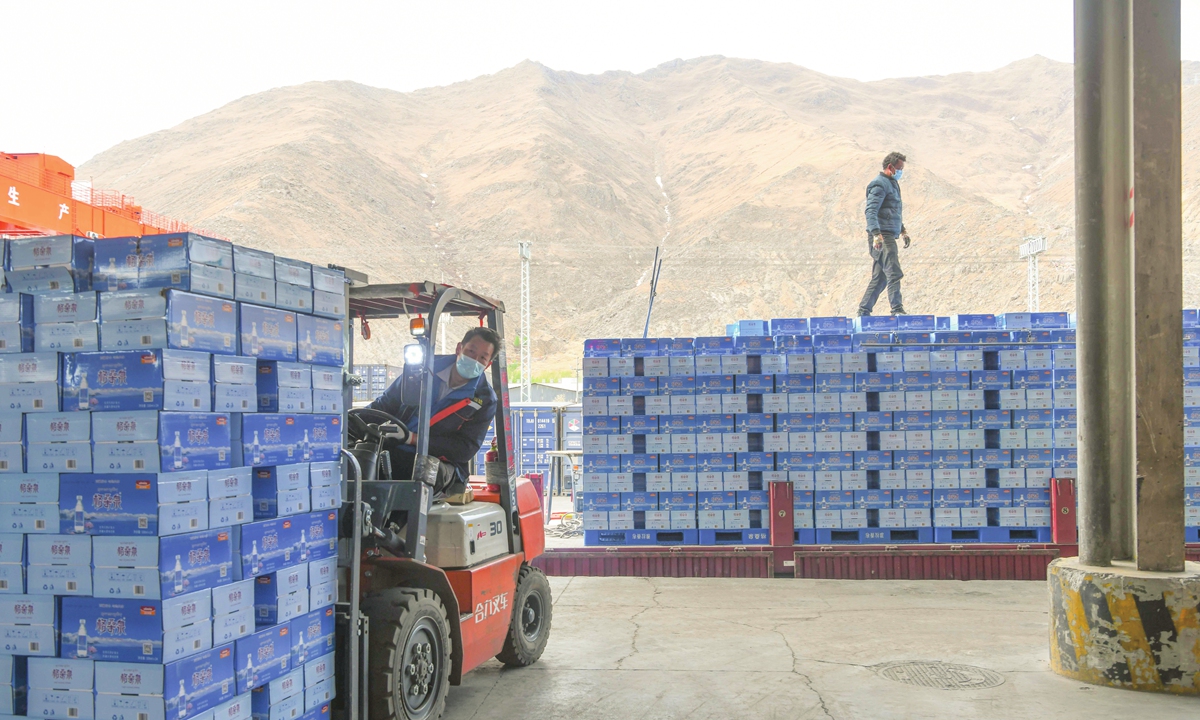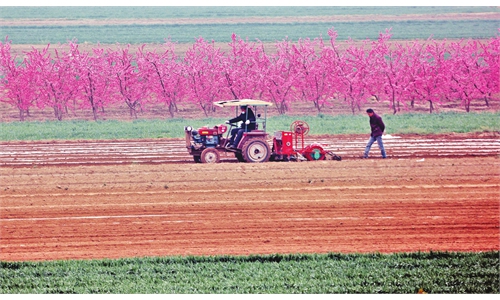
Workers load daily necessities at Lhasa Railway Station on April 10, 2022. The materials are contributed by the people of Xizang Autonomous Region to support Shanghai and Jilin Province which are fighting against the COVID-19 epidemic. Photo: VCG
Several Chinese provinces, including Jilin and Shandong, swiftly landed on the track of resuming production and normal life after stamping out infections within communities.
Zhang Baozong of the Jilin provincial government announced on Monday that Jilin will push for the resumption of work and production, resume normal life, and pare back the impact of COVID-19 controls on social and economic development.
The official also said there should be a balance between the anti-virus effort and spring planting so farmers can work in closed-loop management, and not delay the spring planting season in one of the country's biggest agricultural provinces.
A government official in Yongji county, Jilin Province, who requested anonymity, told the Global Times that his county has been in recent days rolling out work to take farmers in Jilin from their doorsteps to their farmland, where they will quarantine for seven days and then work in closed-loop management.
Packages of fertilizers and seeds will be disinfected collectively and then dispatched to farmers, the official said.
Caseloads in Jilin Province have nosedived in recent days, and the province announced that it had eliminated viral spread within communities during the weekend. In order to control the virus, Jilin Province in early March took strict measures including sealing off communities in several cities and banning people from leaving the province unless necessary.
Lü Jiwei from the Jilin Provincial Department of Commerce also said on Monday that the province will push for staggered resumption of commercial activities, including opening shops and restaurants, while making sure the virus doesn't bounce back. The official also announced policies to relieve pressure on certain companies that are struggling to reopen.
China FAW Group Corp, a major auto company based in Jilin Province, resumed full operation, Sun Jian, an official from the Jilin provincial industry and information technology department, announced on Monday.
The corporation halted production because of the COVID-19 outbreak on March 13.
An employee from the corporation told the Global Times that all employees are required to take antigen tests every day, and the company is giving them medicines as a precaution.
The head of a kindergarten in the city of Jilin (the namesake of the province) surnamed Gao told the Global Times that he received orders from his district that the kindergarten can open after the staggered openings of high schools and primary schools.
"We can open in July presumably, provided that there're no new cases during this time."
Li Ganjie, provincial Party chief of Shandong, also stressed on Sunday the need to strike a balance between maintaining normal life and anti-virus measures after the province eliminated viral spread within communities on March 30.
On the basis of implementing all anti-virus measures, factories should resume operation, employees should go to work, and schools, highways, and cultural venues and scenic spots should reopen, Li noted.
Resuming work and production shortly after curbing community infection is probably a trial being made by those two provinces, which are both engines of the country's food production. Jilin is also home to many auto factories, said a Beijing-based immunologist who asked for anonymity. "Closing for very long will strike a heavy blow not only to their economy, but to the whole country's food security and economy."
He said it's unlikely that those areas will see a rebound with strict implementation of anti-virus measures, and "the warm weather also helps to reduce such risks."


